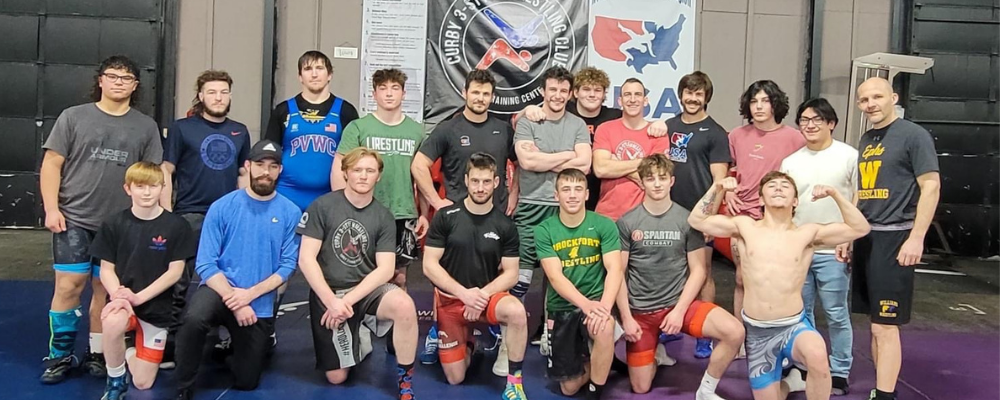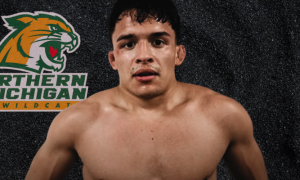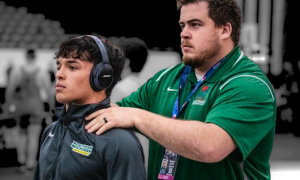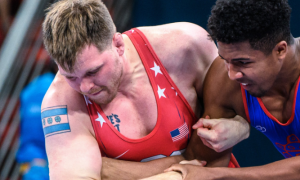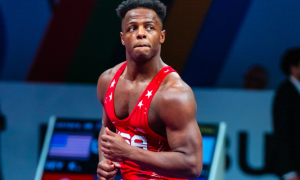Spring break is the best time for collegiate wrestlers to grab a change of scenery while mired in a preparation cycle, which was the case last week for four Greco-Roman athletes from Northern Michigan University’s National Training Site.
Their destination was Curby 3-Style in Troy, New York. Helmed by Joe Uccellini, the expansive wrestling facility drips with a heavy NMU influence. The club itself is named for the late Jacob Curby, who was a multi-time US National Team member and, like Uccellini, came of age developmentally while at Northern Michigan. (An important backstory surrounding Curby 3-Style for those still uninitiated is available here). In addition, Uccellini has shepherded several of his own high school charges to NMU following graduation — one of whom, Charlie Dill (72 kg), was in attendance throughout the week.
On the surface, there was not much more to the circumstances other than some space in the schedule offering NMU athletes the chance for a brief getaway in a different training environment. Campus during spring break, or any break for that matter, is not as happening of a place to be; plus, the wrestling room had already been a touch lighter with eight Northern wrestlers having recently traveled to Europe. Organically, the calendar availed an opportunity and NMU head coach Andrew Bisek took advantage of it. “Our guys were able to get away from the routine over spring break, travel to a different part of the country, and mix it up with younger athletes,” Bisek said when summing up the week at Curby.
That’s all it was, or seemed to be: a former NMU wrestler who now owns a club and his alma mater’s current head coach putting their heads together came up with an idea for a little training camp.
Except, not really.
“Lighting Up the Path”
Originally, a group of Greco athletes from Kyrgyzstan were supposed to be involved. In fact, they were seen as the most attractive component. Kyrgyzstan, located in Central Asia and once part of the former Soviet Union, boasts a strong Greco-Roman wrestling program that has produced a collection of World and Olympic medalists that includes Azkhol Makhmudov, who earned silver this past August in Tokyo. If and when US competitors have an opportunity to train alongside Kyrgyzstani contemporaries, they do so.
But what was intended as a sort of mini international joint-training camp evaporated before it could ever become finalized when the Kyrgyzstan delegation found difficulty securing visas for the trip. NMU was on-board, regardless, and Uccellini pivoted the training plan accordingly.
The result was yet another in a long line of developmental realizations: in order for the United States to once again reach a degree of prominence in Greco-Roman wrestling, micro knowledge requires being passed down on a macro basis among athletes of different ages.
Periodically, the United States National program has attempted to combine age-group wrestlers with Seniors at select camps. Those with skin in the game, particularly coaches, tend to walk away from these training camps voicing a desire to hold more of them. The goings-on at Curby did not break pattern, as Uccellini and Bisek both insist that an increase in such opportunities would open the eyes of young wrestlers to choices they might not have previously considered.
“My wrestlers gravitated towards the Northern Michigan athletes once they got to see them perform, and that was exactly what I wanted,” began Uccellini. “It’s what I grew up with in ATWA (under Joe DeMeo). The college guys and the Olympians who we looked up to, sometimes we got a chance to work with them during practices. That was how you got to see that there is life beyond high school.”
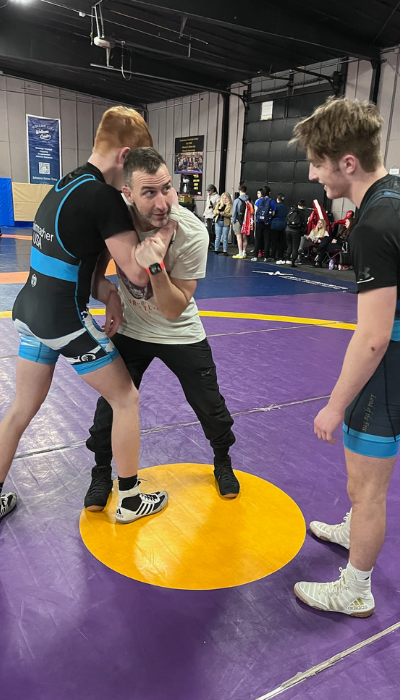
Uccellini demonstrating technique during practice at Curby 3-Style in Troy, New York.
It is not a complicated approach, nor is it a novel one. Throwing young, inexperienced wrestlers (most of whom in high school) into the same room as national-level collegians occurs all over the country, especially when it comes to folkstyle camps and clinics. Greco tends to deviate, however. Most training gatherings are for one age group at a time; and on the Senior circuit, the level of competition is often thought of as too big of a jump in skill to invite green teenagers. This ideology has gradually begun to shift in the other direction. Over the past 18 months, there have been five US training camps that saw Seniors share mat space with their age-group brethren, with 2022’s January Camp in Colorado Springs perhaps the most publicized of the bunch.
But it is still not a regular part of the American training system, which Bisek feels misses the mark.
“This needs to happen more in the US,” he stated, dropping the declaration with a casual yet deadpanned thud. “We need to be lighting up the path and possibilities, and pushing them. Trips like this one strengthen bonds across the board. Joe and I working together, he helped me with things, and I helped him with some things. The wrestlers helped each other, and what that also does is enhance the wrestler-coach relationship. We had our NMU guys teaching some of their own techniques while working with Joe’s kids. Through that process, they start to understand what they are doing, and why they are doing certain things. It’s extremely beneficial.”
“We were focusing on the small details within the moves and later on in the day, I’d partner them up with my best guys and they became mentors,” added Uccellini. “They would be able to practice, but they were also mentoring the next crop of guys.”
Mornings at the camp began with soccer before moving on to wrestling-related activities. Brainstorm sessions were then held in order to target meaningful areas from which everyone might derive new strengths. As an example, Uccellini wanted to leverage Bisek’s prowess from top par terre and called upon the NMU head coach’s gutwrench to lead the way. “I told Andy, ‘you’re the best gutwrencher in the world so let’s do the next three days in par terre,'” Uccellini explained. “We did his gutwrench, his whole series, his defense… I wanted my kids to know why Bisek is a two-time World medalist.”
The Pipeline Effect
Neither coach had designs on using the time in Troy solely as a recruiting tool for NMU, though it was a natural byproduct of Bisek simply walking through the door. Wherever he goes, and with whomever he speaks, Bisek represents the university. It is in his best interests to observe and discern up-and-coming talent in every environment, and he acknowledged that Curby provided a window for scouting prospective Greco devotees. “It helped put the program and myself in front of potential student-athletes here at NMU,” he confirmed.
It helped due to Bisek’s obvious large role relative to NMU’s recruiting goals, but he certainly had Uccellini as a more-than-willing accomplice. Since Curby 3-Style is the only club in New York State that features Greco-Roman as part of the curriculum 12 months a year, there is the sense of a growing pipeline effect. Curby high schoolers who take to the discipline and wish to continue their Greco careers are more likely to identify NMU as a palatable option due to Uccellini’s ties to the college. It then falls on the club coach to invest more into this symbiotic relationship, which he is already planning to do by pointing towards what lies ahead in the summer.
“Before they left, I asked Andy if I could have his guys back as counselors for my Fargo camp if they are not busy during that time,” Uccellini said. “I’d put them through our camp, as well, but they would be here as experts in the sport. Then there is that connection for my kids to where it is, ‘I want to go to school with those guys because they are my future teammates.’ Hopefully it works out.”
Bloodline
The scene wasn’t limited to only a handful of current Northern students and Curby 3-Style neophytes with Bisek and Uccellini patrolling 7,000 square feet of rubberized foam. Midway through the week several others entered the fray.
Two-time World Team member, former NMU’er, and Uccellini’s brother-in-law Jake Fisher (77 kg) flew in from Arizona, primarily to grab some looks against old pal Bisek and participate in actual organized practice sessions. Fisher — who seared to the ’19 National final and was the #1 seed at last year’s Olympic Trials — is without a stable, reliable training situation down in the Grand Canyon State. Still one of the top athletes in the country, the 38-year-old with an at-times surly disposition finds himself in “piece it together” mode this season but was in fine form just the same according to Uccellini. “Jake looked fantastic,” he remarked. “Andy does, too. Jake came here to see Bisek and, to them, this was lab work. It brought them back to when they were in their mid-20’s training together. They were playing chess.”
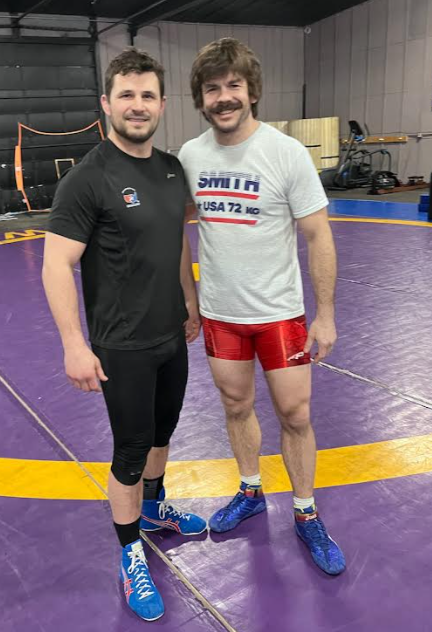
Fisher (left) and Bisek have been through quite a lot together over the years as teammates, friends, and occasional competitive rivals. Nearly two decades after first connecting as students in Marquette, their relationship has not changed all that much as evidenced by their visit to Curby last week. “It brought them back to when they were in their mid-20’s training together,” said Uccellini. “They were playing chess.”
Another and decidedly more recent Northern Michigan alum was in town, as well — ’18 US Open runner-up Jessy Williams (67 kg, NYAC/Spartan RTC), who had returned from a stint in Malmo, Sweden. Williams got some of his own work in while at camp but, as is custom in Troy, also took time to assist the younger lot in attendance. Bisek aiding Curby kids, Fisher tutoring NMU athletes, and Uccellini doing his best to manage a training plan centering around open dialogue is how the week was envisioned the moment it became apparent that Kyrgyzstan was out of the picture. Seems that, at least for this time around, it might have been for the best.
Last Sunday night put Uccellini in a reflective head space. Bisek and company had started their journey back to Michigan the day prior, and Fisher caught a very early flight the next morning. All of his full-time Greco visitors were gone. More work awaited on the club side, such as minding the details for a youth tournament the following weekend, and really just reprogramming for the impending spring push. Soon it will be the “Fargo season”, after all, one facet of coaching he can’t help but supremely enjoy despite the waves of additional responsibilities heaped on his shoulders.
So, Uccellini exhaled, ruminating about what else he might discover in his drive to widen Greco’s pipeline. And more importantly, how his club factors into the equation. It is all enough to spin the wheels close to midnight, which is not Uccellini’s cup of tea so much given his sleeping habits. One more breath brings him back to reality. Back to what this all was supposed to always represent to outsiders while simultaneously retaining the true inspiration to his coaching pursuits in the first place.
“There have been times over the past couple of years when you feel that this is a competitive business and become tempted to make changes,” Uccellini said. “But every time I’ve had those thoughts or feel like I should do something different, I just focus on the name of the club. I think about Jake Curby and our experiences together, and why I wanted our club to carry his name. It’s about sticking to your core and taking care of the people who believe in what you’re doing. You never have to sell something when it’s actually the truth.
“For our era from NMU, giving back is easy because it was all laid out for us perfectly. I already had the template. I had Joe DeMeo and Ivan Ivanov as coaches. Then I had Jacob Curby as a character-hero. I’ve been really blessed.”

Listen to “5PM50: Mr. Fantastic Benji Peak” on Spreaker.
Listen to “5PM49: Robby Smith on coaching, fatherhood and mentors” on Spreaker.
Listen to “5PM48: Austin Morrow and Gary Mayabb” on Spreaker.
SUBSCRIBE TO THE FIVE POINT MOVE PODCAST
iTunes | Stitcher | Spreaker | Google Play Music

Notice: Trying to get property 'term_id' of non-object in /home/fivepointwp/webapps/fivepointwp/wp-content/themes/flex-mag/functions.php on line 999

